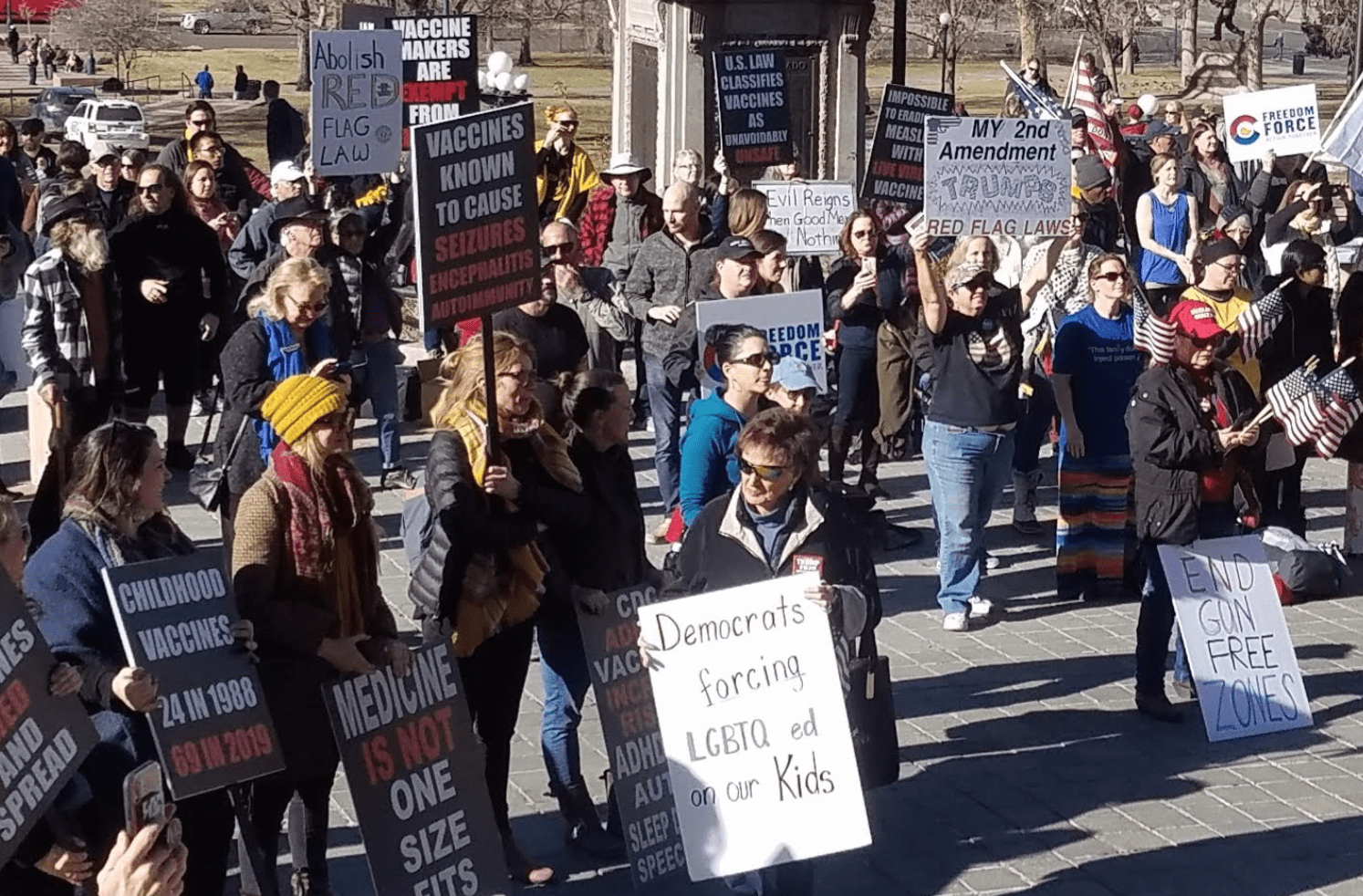For some conservatives, it’s their “parental right” to send their kids to a public school where sex education is designed only for heterosexual teenagers–or to a school that asks no questions about whether students are vaccinated.
And this year, advocates of these so-called “parental rights” are going on the offensive, pushing passage of two pieces of legislation proposed by Republicans in Colorado’s General Assembly.
One bill sets out to establish parental rights as a fundamental right in Colorado law, defining them as the right to “direct the upbringing, education, and care of a parent’s child.”
Sponsored by state Rep. Tim Geitner (R-Falcon), the bill would mandate that their “parental rights” be prioritized above other legal rights, like, perhaps, those that protect LGBTQ people from discrimination.
“It is of utmost importance to codify in statute that parental rights are considered a fundamental right for all parents in the state of Colorado,” the legislation reads.
Another bill would establish a “Parent’s Bill of Rights,” and outlines more specifics on parent’s authority over their minor children, particularly when it comes to health care and schooling.
The bill would make it a crime for physicians to provide health care of any kind to minors — including birth control and treatment for STDs — without prior permission from parents, with the exception of medical emergencies.
It also reaffirms parents’ rights to opt their children out of immunization requirements and any school curriculum they don’t want to be taught to their children, such as sex ed.
Opponents of the legislation are concerned that it would negate a law passed in 2019 that allows minors to get critical mental health treatment without a parent’s consent.
“This bill, like others introduced during this legislative session, does not put the health, safety, and wellbeing of our children first,” said Daniel Ramos, Executive Director of the LGBTQ advocacy organization One Colorado, in a press release. “Instead, it restricts a child’s ability to reach out for healthcare services and to live as their authentic selves. We need legislation that supports and protects our youth—this bill is a step in the wrong direction.”
Concerns from conservatives in the state about what they view as government interference in the upbringing of their children aren’t new.
The issue was placed before Colorado voters over two decades ago, in 1996, when conservative Christian groups pushed the Colorado Parental Rights Amendment.
The initiative was defeated, but the conservative parental rights movement didn’t die. Instead, it resurfaced in the form of state legislation, with Republicans in Colorado’s General Assembly repeatedly pushing various iterations of a Parents Bill of Rights with little success due to a lack of support from Democrats, most recently in 2016.
This year, there’s an appetite among conservatives, from the grassroots level to policy-makers, for this legislation, particularly after a year of Democratic control in Colorado’s legislature that brought bitter disagreements over sex education and vaccination policy. Those disagreements are already bleeding over into this year’s legislative session, with the concept of “parental rights” serving as an ideological umbrella for both issues.
Anti-Vaccine Activity in Colorado
Anti-vaccine advocates were out in full force on the first day of the 2020 legislative session, with hundreds showing up to a Jan. 8 rally carrying signs that said things like “Medicine is not one size fits all” and “It’s ok to question opiates, why not vaccines?”
As the anti-vax community rallied outside the Capitol, Republican lawmakers inside the Capitol introduced two bills that nod to vaccine skepticism.
One, which is sponsored by state Sen. Vicki Marble (R-Fort Collins) and state Rep. Lori Saine (R-Firestone), would prohibit employers from requiring that employees be vaccinated.
The other, from state Rep. Dave Williams (R-Colo. Springs), is titled the “Vaccine Consumer Protection Act,” and would require health care providers to give information “that identifies the risks and benefits” of vaccines to patients and report adverse vaccine-related events. Williams’ bill also states that health care providers cannot “harass, coerce, scold, or threaten” those who delay or deny vaccines for themselves or their children.
And, in a nod to the concept of parental rights, the bill would prohibit anyone from recommending or administering a vaccine to a minor without the consent of a parent.
This anti-vaccine push comes in spite of the fact that Colorado has some of the loosest immunization requirements in the country, in addition to some of the lowest vaccination rates.
Colorado law requires proof of immunizations for school enrollment, but parents are allowed to opt-out for medical reasons, or religious or “personal” beliefs.
A controversial bill proposed last year aimed to address Colorado’s low vaccination rate by requiring parents who wish to opt their kids out of immunizations to make an in-person visit to their local health department for a signed exemption form.
The legislation was fiercely opposed by anti-vaccine activists, hundreds of whom showed up to the capitol to testify against it. The bill ultimately failed to advance in the final days of the 2019 legislative session.
“It’s a very vocal minority,” said Stephanie Wasserman, Executive Director of Immunize Colorado, regarding anti-vaccine activists in Colorado. “Most parents vaccinate and are supportive of vaccine policies that protect schools from vaccine-preventable disease outbreaks.”
“What may have changed recently is that they use social media in a way that amplifies their voice,” she added.
Comprehensive Sex Ed
Then there’s the comprehensive sex education bill that was passed last year, which resulted in large protests and packed committee hearings at Colorado’s Capitol. The bill updated a 2013 law that banned abstinence-only curriculum from public school sex-ed courses (Colorado is one of few states where sex ed is not required, so this only applies to schools that choose to teach it).
The biggest changes were a new grant program for schools that want to teach sex ed but don’t have the means to do so and a requirement that sex ed curriculum includes lessons on consent.
But conservatives continue to fixate on the new law’s language around inclusion for LGBTQ students — language that only reaffirmed rather than changed the 2013 sex ed law that required courses to take LGBTQ-specific health needs into account.
“Democrats forcing LGBTQ ed on our kids,” read a sign at the same Jan. 8 rally where anti-vaxxers gathered en masse.
In an op-ed published last year in the Washington Times entitled “Coloradans Face Serious Threats to Parental Rights,” Jeff Hunt, a leading conservative activist who directs the Centennial Institute, presented the bill as evidence of lawmakers usurping parental rights.
“The state knows better how to raise your children than you do,” Hunt wrote. “That was the clear message sent by Colorado legislators during this contentious legislative session.”
“Rather than allowing parents to share values with their children regarding healthy sexual relationships, the state has forcefully assumed this responsibility,” he continued. “The bill is a continuation of the state’s efforts to force a more and more progressive sexual worldview upon Colorado children.”
This year, Republicans are taking aim at that legislation with a sex ed bill of their own.
The bill would require 90 days notice of commencement of sex ed curriculum that gives detailed information about what will be taught and when, and how parents can opt-out.
Current law already requires that parents receive information about students starting sex ed and what the curriculum entails, in addition to giving parents the ability to opt-out — this bill simply requires that notification happen further in advance.
“This is the answer for the Radical Comprehensive Sex that passed last year,” reads the action page on 710 KNUS, a conservative talk radio station, under the section titled “YOU ARE THE PARENT — DON’T LET THE GOVERNMENT DECIDE.”
Listing the time and place of the bill committee hearing, it reads, “Show up and speak up and make it clear you stand for parents’ rights to know what their children are being taught!”
It’s important to underscore that like with immunization requirements, there are already procedures in place that allow parents to opt their kids out of sex ed.
Still, parental rights legislation is appealing to conservatives who view the increasingly Democratic state government in Colorado as intrusive, particularly when it comes to instilling conservative Christian values in their children.




